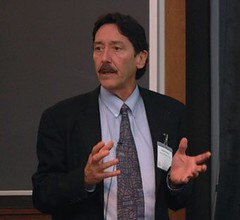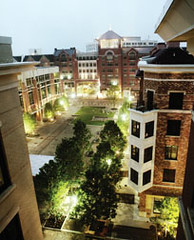Robert Cervero on cities, choices, and transit-oriented development

Posted April 27, 2009 at 1:36PM
If you start mulling through the literature of academic research and writing on the relationship between land use and transportation, one of the first and most frequent names you will encounter is that of Robert Cervero of UC-Berkeley. (Go here and you'll see what I mean.) I have studied and cited his research a lot in my own work.
 Cervero just assumed the leadership of the University of California Transportation Center, and Berkeley's Institute of Transportation Studies has a very good interview with him on their website. Here are some of my favorite parts.
Cervero just assumed the leadership of the University of California Transportation Center, and Berkeley's Institute of Transportation Studies has a very good interview with him on their website. Here are some of my favorite parts.
On problems associated with automobile dependence:
"It's not just reducing congestion and emissions, we have problems of time pollution. We spend so much time traveling to and fro that people no longer have quality time to invest in their neighborhoods or their civic activities. They arrive home exhausted from their long commutes. Sociologists have tied this to social disaffect, where people sort of disassociate themselves from neighborhood affairs. So, I would suggest there are even more deeply-rooted problems associated with transportation problems."
On whether being pro-transit means being anti-car:
"A lot of people like the freedom and individualism of the private car. But I think the difference you find in Europe is that people do own cars, they're just not enslaved to them for any and every trip. They're much more judicious and selective when they use the car or don't. So if you live in a place like Stockholm or Copenhagen, if you go into the central city, everybody takes transit. Stockbrokers, day workers, school kids, everyone. But for regional destination trips, shopping, sports events, or if you're making a late-night trip or doing big volume shopping they drive. For a weekend excursion they drive. So they are not anti-car, but the cities are designed so that transit is a respectable option for many."
 On using transit-oriented development to create value that can be captured for community-building:
On using transit-oriented development to create value that can be captured for community-building:
"The way I envisage TOD is as a compact, mixed use, walking-friendly development oriented around transit stations, mainly train stations. Ideally, these transit hubs become a focal point around which community planning and design is organized. It's a centerpiece for the community that often includes a civic square, where people gather for celebrations, public events and holidays, and these public squares are ringed by day-to-day services and retail outlets so people can combine their transit trip with after-work shopping or a daycare center. They play a mobility function, but they're also a way to organize community planning and development . . .
"I've long felt it is a mistake to let the private sector reap all the benefits of these land value gains that are created by public investment. These are, after all, taxpayer-financed, publicly-invested transit systems. The private sector should share, and by doing so could help fund all the community enhancements-libraries, city squares, and streetscape enhancements. So transit joint development is a way of capturing the value of the land around transit stations. It's a way to return some of the benefits that are inferred by the public investments back to the public sector to help partly retire the bonds and costs of building the transit networks."
 There's lots more, including a very interesting passage about the benefits of transit agencies getting directly involved in shaping development around their stations, and how greenhouse gas reductions might be maximized by a synergistic set of strategies built around TOD. I learned some things just by reading the interview, which you can access in full here.
There's lots more, including a very interesting passage about the benefits of transit agencies getting directly involved in shaping development around their stations, and how greenhouse gas reductions might be maximized by a synergistic set of strategies built around TOD. I learned some things just by reading the interview, which you can access in full here.
Even more intriguing in some ways, though, is Cervero's personal home page, which is nicely divided into left-brain and right-brain sections, including some particularly interesting (to me, anyway, as a fellow owner of a vintage D-18, see photo) stuff on music.